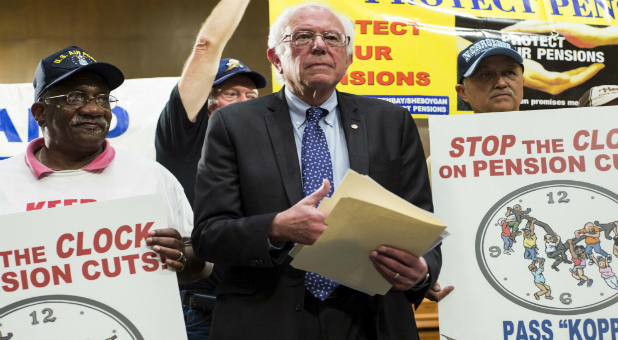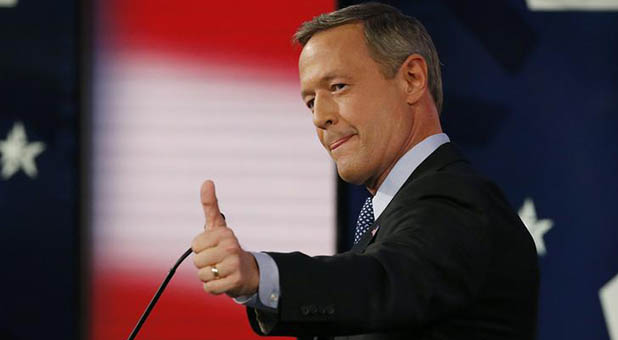On the presidential campaign trail, Senator Bernie Sanders’ rallying cry is “political revolution.” The Vermont senator draws big crowds as he incriminates the wealthy for perpetuating an American oligarchy. Calling for policies that can transform a long-suffering lower-income majority into a true middle class, Sanders speaks passionately about the economic hardship of the 99 percent.
When I asked Sanders who his political hero is, he quickly named labor organizer Eugene V. Debs, the six-time socialist presidential candidate. His ideas, Sanders said, “ended up becoming part of Roosevelt’s New Deal.” Though he calls himself a socialist and sits in Congress as an independent, Sanders is running for president as a Democrat.
At the Iowa Democratic Party’s celebrated Jefferson-Jackson dinner, Sanders urged citizen activists not to “turn backs on the political process.” He reiterated, “You are not on the sidelines of these struggles; you are in the middle, and that is what our campaign is about.”
This is Sanders’ effective message for his supporters outside the political orthodoxy: We need to operate within the Democratic Party in order to achieve a progressive agenda.
History demonstrates that alternative party candidates – including Theodore Roosevelt’s Bull Moose platform in 1912, Ross Perrot’s two independent bids in 1992 and 1996, and Ralph Nader’s green presidential campaigns – are destined to reinforce the status quo rather than upset it.
In choosing to run as a Democrat, Sanders has clearly learned a lesson from Henry Wallace’s unsuccessful 1948 third-party presidential campaign. Like the former Burlington, Vermont, mayor campaigning for a $15 living wage, Wallace endorsed a like-minded “people’s revolution” that makes genuine freedom attainable for working-class Americans.
Wallace, who had served as President Franklin D. Roosevelt’s vice president during his third term, bucked the Democratic Party to oppose President Harry S. Truman’s candidacy for election. A son of Iowa, Wallace was the nation’s leading progressive politician – a champion of the American farmer. He represented the voices of rural voters, as well as disenfranchised African-Americans.
Pressing for a “century of the common man” in “a fight between a slave world and a free world,” Wallace vowed to renew the New Deal vision of economic security for all Americans. In fighting to ensure an adequate standard of living, he proposed a new economic bill of rights in the spirit of Roosevelt’s “Four Freedoms” – from want and fear, and of speech and worship.
When Roosevelt chose then-Secretary of Agriculture Wallace to be his running mate in 1940, conservative Democrats fought against it. By the 1944 campaign, the party’s conservative wing of influential Southern conservatives, along with Northern urban-machine bosses, pressured Roosevelt to drop Wallace from his ticket. As the staunchest ally of New Deal domestic policy, Wallace argued more forcefully than the moderate Truman for redistribution of wealth, collective bargaining and continued protections of labor to bring more equity to workers.
“FDR did not ‘drop’ Wallace,” said William Leuchtenburg, professor emeritus at University of North Carolina and dean of the Roosevelt historians. “Rather, he sluggishly went along with party leaders who did not want Wallace,” Leuchtenburg explained in an email. “My point is only that he took no initiative toward disposing of Wallace, and would have been content to run with him again.”
Wallace’s efforts to breathe new progressive life into the party backfired. Instead of strengthening the morale of the original New Dealers, Wallace disbanded the Roosevelt coalition into a minority stake within the Democratic Party. Rather than influencing Truman’s agenda, Wallace alienated himself and his cause from the party.
Political scientist Karl Schmidt, examined Wallace’s creation of the Progressive Party in his book, Henry A. Wallace: Quixotic Crusade, 1948. It ultimately demonstrated, Schmidt wrote, the “continuing pattern of failure” among third-party competitors in a deeply entrenched two-party system.
Joe Lowndes, a political scientist at the University of Oregon, agrees that the two-party system is entrenched in the free-market capitalism propelled by a conservative counterrevolution “We are in a very different era than 1948 now,” Lowndes said. “The country is so far to the right that Sanders looks much like a mid-century liberal Democrat.”
Despite the Truman administration’s support for expanded healthcare and employment, it was unable to prevail against a “do-nothing Congress.” The void of New Deal activism swung the pendulum from what Sanders considers the socialistic Democrats to the corporatist Democrats.
Unlike Wallace in 1948, Sanders realizes the necessity of Democratic affiliation in order to deliver his intended goals. Moreover, his popularity among self-identified progressives can be a bridge to a modern era of New Deal-era policy. Even if he doesn’t win the Democratic presidential nomination, his conciliatory approach is poised to usher in a new generation of voters for the party.
“Democrats win when voter turnout is high” is a common Sanders refrain. If this is true in 2016, his supporters may not only embolden the party’s general-election prospects, but also drive the next president to govern for the common woman and man.
Alexander Heffner is host of “The Open Mind” on PBS stations. He is the Fitzwater Fellow at Franklin Pierce University.
©2015 Thomson Reuters. All Rights Reserved.
See an error in this article?
To contact us or to submit an article






















